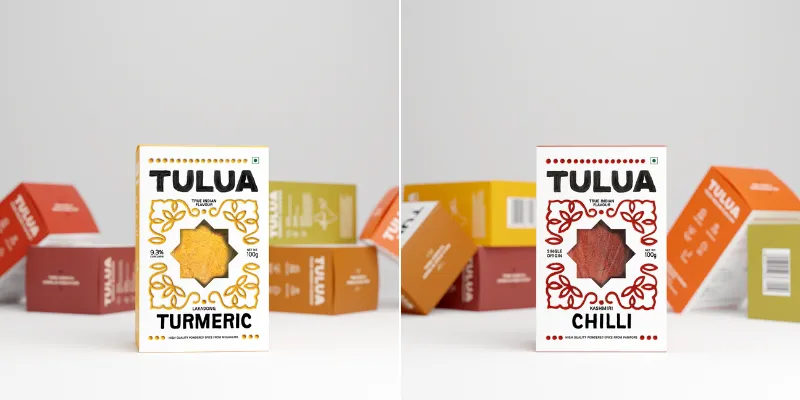Tulua simplifying Indian cooking with foray into Indian spice market
Tulua started as a ready-to-cook culinary brand, which in two years, entered India’s spices market. It now supplies to major hotels and airlines, including TajSATS.
In a world where the spice market appeared saturated with numerous options, Mumbai resident Richy Dave saw a huge gap—the lack of quality standardisation in the unorganised whole spice market.
An avid enthusiast of Indian cuisine, Dave saw this as a great chance to start a new venture. Besides her marketing company, she launched a ready-to-cook food and spice brand, .
However, her first entry into F&B happened in 2020 by selling ready-to-cook food and not spices. When she couldn't find good raw material sources of authentic and clean spices for her food business, she expanded Tulua to include whole and powdered spices.
Living independently for a while, Dave understood the time-consuming nature of Indian cooking. “Ready-to-eat curries were available, but they lacked authenticity and were filled with additives, stabilisers, thickeners, etc.,” Dave tells YourStory.
“I started exploring ready-to-cook options like pre-made masalas, which offer both convenience and authentic flavours, making it easier for people with busy lives to enjoy genuine Indian dishes, and I landed up with Tulua,” she adds.
Bootstrapped with nearly Rs 25 lakh from her savings, Dave started the brand in 2019 and spent a year in R&D before it hit the market in 2020.
But why foray into spices?
Dave faced challenges in sourcing clean and unadulterated spices while producing ready-to-cook items without any chemicals, flavours, or colours. It took her several months to find the right ingredients and establish a supply chain, ultimately leading her to enter the spice segment.
She sourced turmeric powder from Lakadong, Meghalaya, whole Kashmiri chilli from Pampore, Kashmir, coriander from Rundhiya, Rajasthan, etc.
From ready-to-cook to whole spices
Dave started by targeting the HoReCa segment and approached chefs at hotels and restaurants with samples and the response was very welcoming, which marked the beginning of Tulua. “For our ready-to-cook range, we focus on regional cuisines, and that’s our USP,” Dave says.
At present, Tulua caters its ready-to-cook range to 150 restaurants, cafes, and hotels, including Ramada, Taj, etc., and airlines—TajSATS. It also exports to Pittsburg, the US.
The brand has a range of around 13 products with five in the ready-to-cook category—Ghee Roast, Malabar Curry, Malaikari, Butter Masala, and Vindaloo, and eight in the whole and powdered spices, including turmeric, Kashmiri red chilli, coriander, mustard seeds, etc.

Tulua spices range
For several centuries, India has been known to export spices, and as one of the global leaders, the country is consistently growing its position in the spice market.
As per the Indian Spices report, the trend of spice exports from India remained steadfast in FY21, surging to $4 billion, marking a historic milestone in spice exports.
In FY23, India’s spice and spice product exports amassed a whopping 1,404,357 tonnes, with a total value of Rs 31,761 crore, but the local quality consumption is very low.
Dave says, “It is disheartening to see that despite being good exporters, we at origin aren’t exposed to quality products. In the wholesale B2B market, from where various restaurants, hotels, and caterers, source spice are unbranded and sold mostly by unorganised players, and this is where Tulua brings the change.”
While the founder didn’t disclose revenue numbers, he claimed the company has seen a staggering 900% revenue growth over the past eight months.
Challenges and the way ahead
Amid fierce competition, Tulua stands out from traditional spice brands, with its emphasis on clean label, transparent sourcing, and exceptional quality.
Dave says, “We value culinary traditions and aim to provide the best, authentic spices and 100% clean ready-to-cook pastes that enhance the cooking experience. What truly sets Tulua apart is our dedicated focus on single-origin spices, direct sourcing from farms.”
Tulua faces one of the biggest challenges in the retail segment, which Dave says is like “chasing our own tail”.
“These days, creating a presence in modern retail and standing out among a plethora of brands is challenging, but there are perks of seeking attention from numerous customers. Being present in local shops is easy, but the payment cycles are too long, and this is a continuous challenge and retail still remains a question for us,” she says.
In August 2023, Tulua made its presence online through its D2C platform and Amazon, and according to Dave, the brand is getting good customer traction. In April this year, it also raised undisclosed seed funding from BestVantage and Hem Angels.
Dave says she has ambitious plans for the brand in FY24. “We are on track to achieve a 40X increase in revenue compared to the previous fiscal year.”
Edited by Suman Singh







